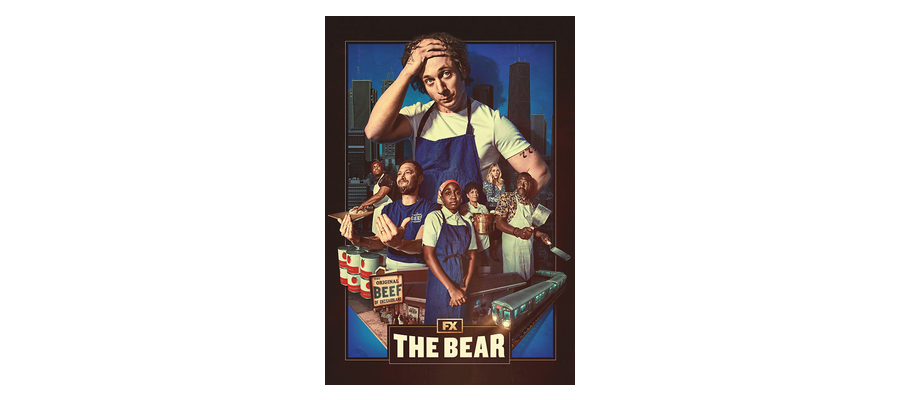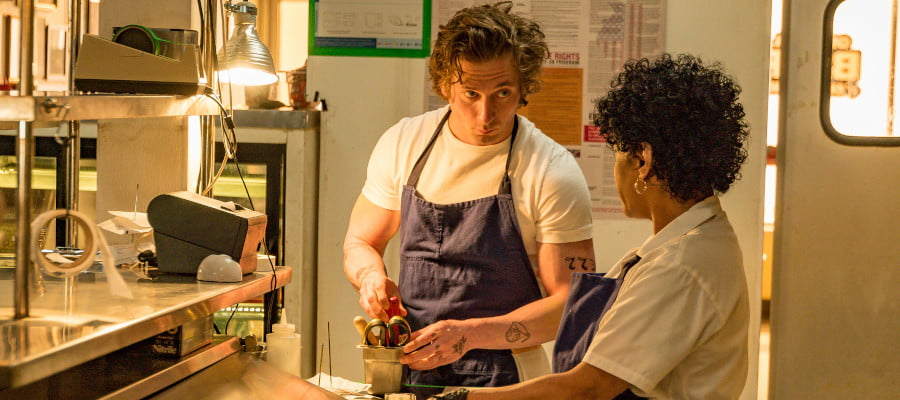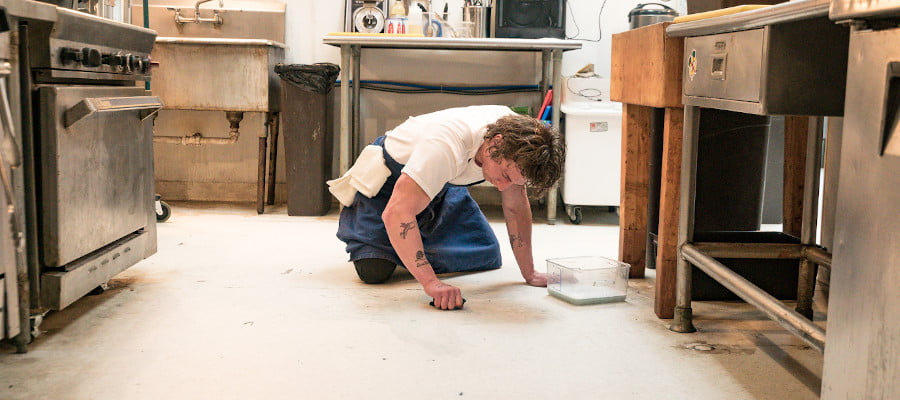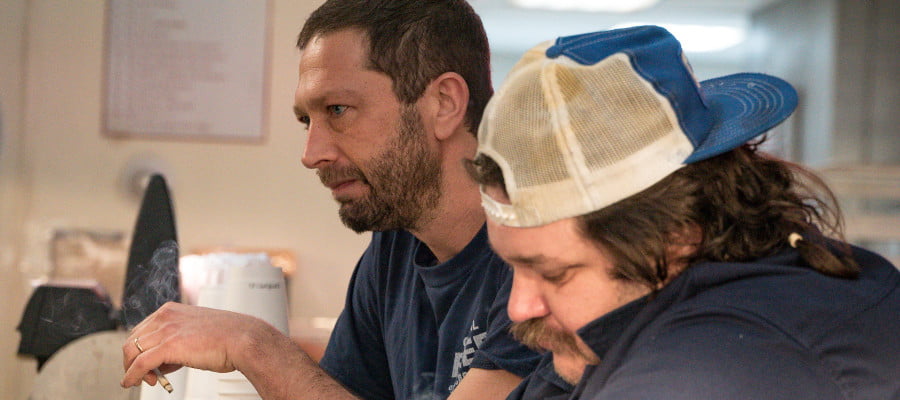Coming up later on FX’s The Bear: join Carmy, Richie, Sydney and Marcus, as they learn how to give a care! But first…

The Bear is filed as a ‘comedy-drama’ which I think is perhaps coming from a different definition of comedy than I’m used to. It’s definitely got some funny stuff, after you get past the immense downer of a subject material and the way the whole series is about feeling tense in your gut as you follow the exploits of Carmy, The Bestest Chef Boy, who Chefed The Best until he couldn’t Chef No More because his Chef Brother stopped Chefing to a Permanent End. Now he’s no longer in the fancy restaurants that demand his skills and in his Chef Brother’s mere sandwich shop.
It’s pretty good!
I’m going to go into this with a mild spoiler warning – a discussion not of specific events but to let you know things that are structural to the story, but while I’m doling out warnings, this show kicks off with a character committing suicide, and a huge chunk of the story is about characters left behind that event confronting that trauma. There’s also workplace abuse trauma, money anxiety, suicidal ideation (though they really, really don’t address it like that), support groups, a lot of stuff around drugs and some kids getting their hands on drugs. Oh and guns being discharged. Also there’s an outside chance there’s some racial workplace coding stuff that I’m not quite aware of.

There’s this phrase you might have heard used in the conversation around modern TV and by modern I mean TV that’s about twenty years old because Mad Men and Breaking Bad were still following in the footsteps of The Sopranos and millenial audiences pretty much found the first thing that made them feel mature and reiterated on it endlessly, but the term is Difficult Men. The whole of this genre has been building and rebuilding this basic idea; that the struggles of a single man who has reasons to avoid things that solve his problems (almost all emotional) in order to focus on the things he thinks of as giving him value (and almost never do). It’s a solid structure, and if you know about it it can make ‘yet another one’ in the genre feel tiresome. To be a full warning, The Bear is a Difficult Men story, but it has a twist:
There are two difficult men.
Kinda.
You could also see it as having three difficult men, with one of them committing suicide, bailing out of the story, and see the way that he trained his two closest friends to be the same kind of difficult man as he was. And the setting of the story, the compressed, confined, high-demand high-turnover hot pressured space of the kitchen, gives these two difficult men, Richie and Carmy, opportunities to absolutely not deal with their issues because they’re way too busy being good at the thing (that they’re not good enough at).
It’s an interesting dramatic framing, because you get all that tension of The Difficult Men and their Difficult Difficulty, but to keep them from getting over themselves long enough to resolve anything, you can always just use the natural byproducts of an extremely badly-run kitchen full of assholes.
Erm.
I promise I like this show.
It’s hard to like, though. Part of why it’s hard to like is that the story spends a lot of time with Carmy and his personal challenges, and his trauma, and mostly shows Richie in how he treats other people, which is, like a gigantic asshole. There’s a lot more time focusing on Marcus’ and Sydney’s inner life, while as an audience, we just don’t really spend nearly as much time in Richie’s head, grappling with the experience of being Richie, and not until after a lot of other stuff has happened.
It can make a lot of the experience of Richie instead being about dealing with this awful dude who just tries to direct his awfulness at other people, and then expressing distress at what a failure he is, at how bad he is at doing the thing he’s doing, but also how defensively he attacks anyone who wants him to change that.
I bring up how difficult Richie is to deal with (for me) because I really liked this show but it’s very deeply entrenched behind the way the story likes just squeezing tension out of things. The tension-release cycle here is less of a build into a release and more a mild snap followed by a gasp. And for me, I spent my time thinking of Richie as something to endure, Carmy as something to semi-endure (until he starts to improve), and then once I had eaten my vegetables, I could appreciate scenes of Sydney and Marcus and Ebrahim.

Despite being a short, eight-episode season story, The Bear does pack in those episodes pretty tight. It feels a lot like a streaming series, where instead of building around the structure of ad breaks, The Bear is there to encourage you to watch episodes in big chunks, with each episode feeling a bit more like it’s hooked around a specific theme or vibe to concentrate execution. This is probably most obvious in the Episode 7, Review, that is almost ‘all in one,’ with seemingly no cuts in the episode as it follows the characters in real time, like it’s a big special treat, then there’s a breath in the credits between each episode.
It’s very tightly bound together; there’s a bunch of stuff happening here, and the sequence of events and the ways people are confronting their relationship to those sequences of events are pretty interesting, and part of how it works is it relies on putting you at least in part close to Carmy’s experience. In order to do this, The Bear needs you to feel exhausted, overwhelmed, and absolutely like you could get your hands around this if you just had a little bit more. The story keeps on presenting positive things, a positive output — they keep making good food after all, the food is no challenge at all — but none of it is going to make the random happenstance and helpless collapse of the events around them easier to deal with. None of it is going to address the problems inside the characters that are the problems, which means we get to tie the story’s development and their character development to one another, and all the story space needs to do to make that happen is to take a moment to not rain down a new problem, a new random piece of misfortune upon our characters.
It’s really good stuff when it’s focused on characters! It’s really great at giving you a reason to focus on and care about the characters you care about and the things they care about. Almost everyone is fascinated with and focused on something that would improve their situation, sort of, or they’re kind of an awful jerk whose excuse for being an awful jerk is their job sucks, and their job sucks, in part, because they go in and be a huge jerk about it. Someone stopping being a huge jerk for a bit and maybe holding back on like, yelling at someone, that’s a good thing, and it sounds like a complaint for this show but the way it’s told and the way it’s presented is that it’s extremely gratifying when someone who’s spent the whole series being a dickhead decides to be mildly nice it feels like a wonderful seachange.
And I get it, part of this is also a tension of the place. The story of The Bear is in part, a story about the way the people in the space feels like you should be this way. Everyone is angry and deprived and bitter and coping and that means that it’s just how the story goes because we’re from this place and it sucks and don’t you dare pity us. There’s a really good joke about how hot dogs ‘should’ be eaten that kind of encapsulates the whole moment. People Here Get It, and this should make you Feel Like You Get It.
Oh, and the last-minute plot point is stupid.
Gunna be weird seeing how that goes next season.

Chefs, in media, are so often used as a metaphor for the media makers themselves. There’s a lot in the existing landscape of making media in high-pressure environments (like, the kind that get to make TV shows), that you could, say, draw on, to create a cooking environment, where everything’s happening and you’ve got to keep so many pieces going and manage them and tempers flare but you can get through it if you focus on the outcome and grrr and oh yes, that guy’s a jerk but he’s just so good at his job and I’ve been in commercial kitchens?
I’ve seen them?
And you know, it’s weird, because, yes, lunch rushes happen, food needs to move, people need to get food, and food needs to take time getting made in batches and yeah, there are pinch times and there’s pressure to get work done quickly and all that, but…
like…
It doesn’t look like that to me?
It’s not a bad story because it doesn’t gel with reality as I’m familiar with it. It’s not a bad story at all! It’s just that when I watch this kind of show, I wonder about the people it speaks to, and the people who are doing the speaking. I kinda wonder what it says that there’s this guy who’s having episodes and who wants the place to burn down, and the solution the story seeks is to… keep doing the same job, but just, harder and better.
I dunno, are you alright, Dead Author?